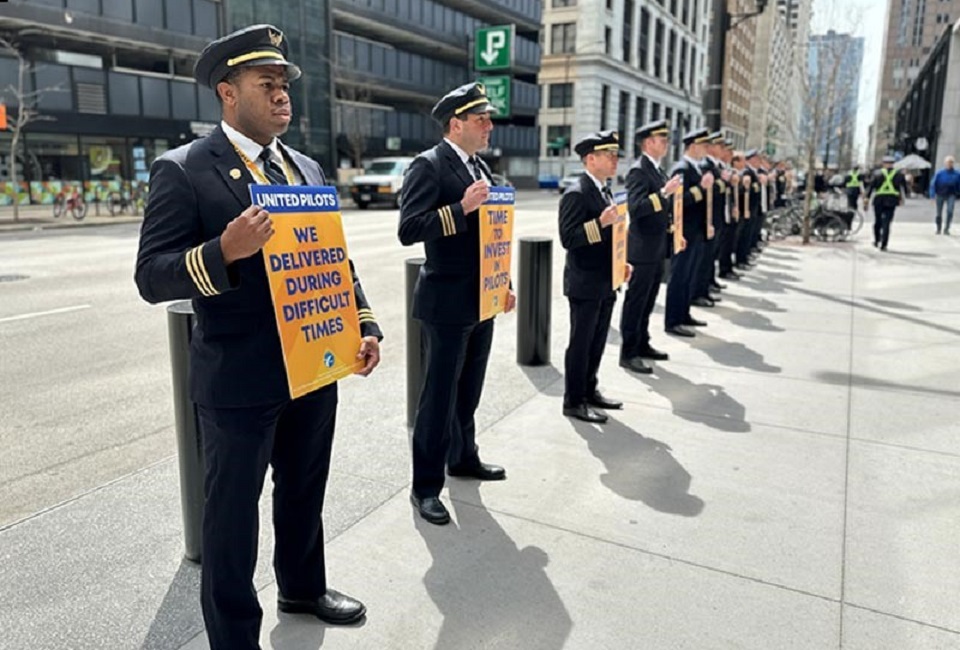
CHICAGO—Stagnant pay, staff shortages, and erratic scheduling by their airline bosses forced thousands of pilots at two of the nation’s four big passenger airlines—American and Southwest—to overwhelmingly authorize their union boards to call strikes. Pilots at a third, United, are flying in that direction. Pilots at one big freight carrier, Fed Ex, authorized a strike, too.
At least U.S. pilots have yet to be forced to walk. Instead, they’re asking the National Mediation Board, which governs airline worker-boss relations, to arrange mediation and arbitration and to start the mandated 60-day clock ticking towards actual strikes, if no contracts are reached.
By contrast, their 1,800 colleagues at Calgary-based NatWest, Canada’s #2 airline, gave officials their legally mandatory 72-hour notice to strike. They’ll walk starting at 3 am Pacific Time on May 19. NatWest grounded its planes May 18.
The reasons and the scenario involving the thousands of U.S. pilots are almost identical to those which brought the 115,000 U.S. freight rail workers, represented by 14 unions, to the brink of a forced national strike last Nov. 9.
Like the railroaders, the pilots face low-ball pay replies from the air carriers at a time of rising company profits: $9.9 billion combined last year in North America and an estimated $11.4 billion this year, the International Air Transport Association says.
Like the railroaders, the pilots want to share in the largesse. Their target: Matching or exceeding the 34% raise over four years their 15,000 colleagues at the other big U.S. carrier, Delta, got last year. There were scheduling improvements at Delta, too. Pilots are notoriously anti-union Delta’s only unionized workers.
Pilots, like railroaders, also cope with erratic scheduling and watch overworked and underpaid colleagues leave the profession. And they too find the carriers putting profits before people, even the people who fly the planes. That, too, is what freight railroads have done to their workers since 2014.
Pilots and railroaders are subject to the same federal law, the 1925 Railway Labor Act. It’s enforced by the same agency, the National Mediation Board. Pilots face the same legal delays in their right to strike and could see Congress impose contracts, too.
Here’s the situation at each airline:
United: The 15,000 pilots for the Chicago-based carrier took their campaign to the streets weeks ago, ringing the Sears (Willis) Tower, the site of United’s headquarters, just east of the Chicago River in a public protest. They haven’t had a raise in four years. They also picketed nationwide on May 12. “United pilots will always be there for our customers,” said Capt. Garth Thompson, United council chair for their union, the Airline Pilots Association (ALPA).
“Unfortunately, the same cannot be said about management, who seems to think that a last-minute cancelation of a pilot’s scheduled day off, or abrupt trip reassignments that extend into planned days off is acceptable for a pilot’s family…Pilots want the company and the public to know the bold ‘United Next’ growth plans cannot work without an updated pilot contract.” There are at least 100 pilot vacancies, he says.
Southwest: The Dallas-based airline just celebrated its 50th anniversary and its 10,000 pilots joined in—and on May 12 authorized a strike by a 99%-1% margin in a 98% turnout.
“You share SWAPA’s dissatisfaction with the current Southwest leadership and their aimless trajectory,” Southwest Airlines Pilots Association President Capt. Casey Murray wrote his colleagues after the vote. He noted 124 pilots have left Southwest this year alone, for other airlines or other professions, in disgust. Most of them are younger. Murray predicted that unless bosses change course and put people before profits, passengers would soon follow those pilots out the door.
SWAPA published a list of the departees’ comments on its website, and they were scathing. “Making mistakes is how we learn, but repeating the same ones over and over” as Southwest’s current managers have, unlike its legendary founder, “is simply unforgivable,” Murray wrote.
American: In early May, its 15,000 pilots voted 99%-1% in a 96% turnout to authorize a strike. Allied Pilots Association President Capt. Ed Sicher told Miami’s WTVJ-TV bargaining has dragged on for more than four years. “We’re hoping they’re going to come to the table and look at these win-win solutions we’ve put on to get guys to go to work–to incentivize them flying on days off, not force them,” Sicher said.
Added spokesman Ed Tyjer in a NewsNation interview: “Our ideas will definitely do something to repair and bolster the summer reliability, but management right now is just not seeing that.”
Fed Ex: Pilots will picket at its main air hub, in Memphis, Tenn., on May 24, following a 99%-1% strike authorization vote in a 97% turnout. That airline, too, celebrated its 50th anniversary with its pilots saying its original philosophy of people-service-profits has flipped to put the profits first.
The strike authorization vote “sent an undeniable message to flight management that we are ready to go the distance up to and including exercising our rights to self-help under the Railway Labor Act (RLA) to secure a contract that reflects the value we bring,” said ALPA FedEx Council President Chris Norman. Talks have been going on for two years to replace a contract signed in 2015. FedEx has 5,500 pilots, most of them in the U.S.
Negotiating committee chair Capt. Pat May told council colleagues on April 18, in a video now on YouTube: “Management has thrown a lot of roadblocks in front of us, but were still on our way to our goals…If the company shows up at the table at any time and says ‘We’re ready to get the deal done,’ that’s when we move to the final stages of negotiation. That’s when we get to the end game.”
NatWest (Canada): The 1,800 pilots, also represented by ALPA, plan to strike Canada’s #2 airline at 3 am May 19. Pilots at Canada’s #1 carrier, Air Canada, sent a message of solidarity. Their independent union just merged into ALPA the week before the NatWest vote.
We hope you appreciated this article. At People’s World, we believe news and information should be free and accessible to all, but we need your help. Our journalism is free of corporate influence and paywalls because we are totally reader-supported. Only you, our readers and supporters, make this possible. If you enjoy reading People’s World and the stories we bring you, please support our work by donating or becoming a monthly sustainer today. Thank you!










